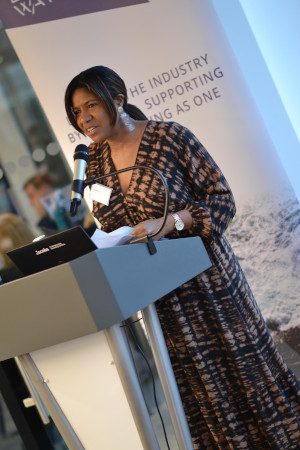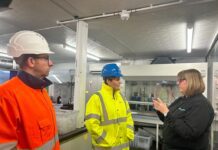
The sixth British Water Data Conference, which took place on 3 November 2022, kicked off with a warning from keynote speaker Oliver Grieveson on the “dangers and opportunities” around digital transformation.
The event took place at the Royal College of Pathology in London, but the body of water infrastructure was the one under examination on this occasion, not least, the health of the instrumentation monitoring some 375,000 combined sewage and stormwater overflows (CSOs) in the UK wastewater network.
“A lot of that data we know is false,” Grieveson said, “because of the quality of what we’re doing with instrumentation.” He also reflected on the “sheer volume of data about to hit the water industry” as new instrumentation comes online in the next few years, and the challenge to the people tasked with making sense of it.
The conference gave delegates the opportunity to hear updates from a number of winners of Ofwat’s innovation competitions first hand. The projects led by Yorkshire Water, Anglian Water, Severn Trent Water, South West Water and United Utilities are funded by the £200 million Innovation Fund set up by the regulator to help grow the water sector’s capacity to innovate.
First up was Yorkshire Water’s Blockage Predictor Project set up to identify sites at risk of pollution. With sensors deployed across the utility’s CSO asset base, Heather Sheffield, the utility’s integrated planning & central control manager (wastewater), said 24% more blockages had been found and 65% were detected earlier than previously.
Speaking of the value of finding the right partners to collaborate with, in this instance German technology company Siemens, she said, “One of the challenges we have is that concept, culturally, that we can do everything ourselves – and we just can’t. This partnership has helped accelerate some of this thinking and the implementation of AI [artificial intelligence] across our asset base to help us manage service risk.”
Next was Anglian Water’s £8 million Safe Smart Systems Project (SSSP), which involves 26 partners, and focuses on the first steps to achieve autonomous control of UK water systems. Presenter George Schley, consultant business architect/analyst at US engineering company Jacobs, explained that digital solutions need to be scalable and adoptable by other water utilities.
“Defining the common language” is one of the most important things in the SSSP project, he said, promising that an information management framework (IMF) was an output of the project that would be “shareable with everyone”.
Schley also spoke of the challenges of getting data from operatives in the field who are sometimes working under the most difficult circumstances, at night and in bad weather: “People are one of our most important sensors.” he said.
His thoughts on the importance of people were echoed by South West Water data scientist James-Pascal Mercer, who is involved in another Ofwat funded project examining the effect of tourism on area-level water demand in Devon and Cornwall and how it can be used to make predictions.
After sharing results showing greater correlation of visitor numbers and demand in coastal areas, he said, “The operators already knew intuitively what the data revealed from their years of experience. We wanted to verify it.”
Gigi Karmous-Edwards, founder and co-chair of the Smart Water Networks Forum (SWAN) work group for digital twins, said that setting best practice on these advanced digital tools is an important next step. Building on the theme of a shared language, she proposed that everyone adopt a common definition of a digital twin as: “A dynamic digital representation of real-world entities and their behaviours using models with static and dynamic data that enable insights and interactions to drive actionable and improved outcomes.”
The meaning of open data given consideration by a number of speakers, with Adam Cartwright, head of IoT applications at Siemens asking, “Data open to who? Interoperability is more important than openness. The public don’t need to know the efficiency of a pump, they need to know the outcome.”
Thanking delegates at the end of the packed day, Tracy Britton, chair of British Water’s Data & Analytics Focus Group, and smart water solutions director at Jacobs, came back to the theme of collaboration: “We have to get better at not just talking about collaboration, but enabling it,” she said, highlighting the Ofwat projects and the need to take them out of silos and “bring everything together”.
The event was sponsored by Innovyze, an Autodesk company, which provides digital software for water professionals.







